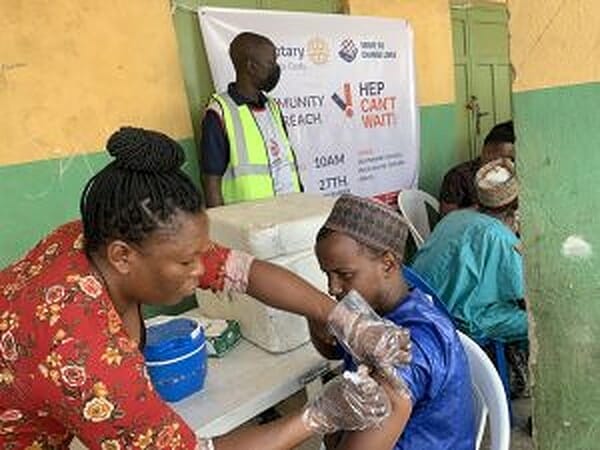The Rotary Club of Abuja, Gudu, have observed that most children are not immunised against hepatitis virus at birth due to use of traditional birth attendants.
The president of the club, Chinelo Ofoegbunam, made this information known at the screening and vaccination of residents of Ruga Fulani community in Abuja on Saturday.
According to her, the personnel of the club screened and vaccinated more than 500 members of the community towards ending the spread of hepatitis virus.
“Early detection of hepatitis is important as it is easily transmissible. Most of them gave birth at home, through the use of traditional birth attendants and we are here today to test them first. We want to know whether they have any of the hepatitis A, B or C first, then if positive, they would be referred to a hospital, then followed up and if they test negative, they will get the vaccines,” she said.
Ofoegbunam said the club was also carrying out blood drive interventions in partnership with the National Blood Service Commission for genotype testing, blood donation and wellness. She said Nigerians had a role to play in promoting humanity, noting that there was need for more hands to be on deck to achieve this goal.
The Chairperson, Hepatitis and Polio Plus Committee of the club, Rita Sule, said that the intervention was done because many people still lacked access to accurate information about their health condition.
According to her, it is important to spread the message of vaccines as a way towards preventing spread of hepatitis, as tests carried out have shown cases in the community.
Sule called on Nigerians to partner with humanitarian organisations in other to meet the needs of the populace.
Similarly, the Donor Recruiter for National Blood Service Commission, Omotayo Ottun, said that the commission was working to ensure access to safe blood for all Nigerians.
“As humans, there will always be a need for blood, and we cannot get it from animals, that’s why we always call for blood donation. Pregnant women, people and children with blood disorders and diseases need blood always that is why we don’t sell it, we give back to those who need them for free”
“Irrespective of your blood group, within the ages of 18 years and 65 years, you can donate, for a man, he can donate every three months, while a woman can donate every four months,” she explained.
Ottun said that the benefits of blood donation could not be quantified, as it is an avenue to replenish the body, and a way of contributing to humanity.
Dr David Nwedu, from the Hepatitis Zero Project, said hepatitis affected the liver and kills its victims if left untreated, soliciting more awareness for mass mobilisation for vaccination.
He said early detection played a huge role in managing the virus, usually contracted through bodily contact with an infected person, saliva and sexual intercourse, among others.
“Avoid those living with hepatitis virus, avoid blood contact, if someone is sick or injured, protect yourself by wearing gloves and protective outfits. This virus survives more than seven days outside those carrying it, and it can be transmitted easily, so that is why we are calling for continuous screening. Anyone without the virus will be vaccinated three times for the next three months, and this covers 30 years, you must take the full dose of the vaccine to be covered,” he said
